Pulmonology: Many individuals experience a range of lung and respiratory
issues during the summer months, attributed to factors such as dry weather,
elevated temperatures, and excess humidity. Common pulmonology concerns during
this season encompass bronchitis, asthma, chronic obstructive pulmonary
diseases (COPD), and emphysema.
- Air Quality Changes:
The heat from the sun and high temperatures can impact airway dynamics,
leading to inflammation that disrupts normal respiratory function and
exacerbates symptoms of respiratory diseases in summer.
- Environmental Factors: In summer, the air
becomes notably dry with increased humidity levels, alongside sudden
temperature changes, all contributing to prevalent respiratory issues.
Patients with prior respiratory conditions like bronchitis, asthma, COPD,
and emphysema may experience aggravated symptoms, including dyspnea and
other respiratory distress.
- Allergens and Pollutants: Elevated allergen levels
during warm and humid weather, including increased dust and mites in the
air, pose additional challenges to lung health, particularly affecting
children and exacerbating respiratory problems.
- Pollen and Air Pollution: The rise in pollen
count and air pollution levels during summer further exacerbate
respiratory symptoms, leading to increased wheezing, coughing, and
shortness of breath. Studies indicate that hot air can worsen lung
irritation in individuals with respiratory issues like allergic rhinitis.
- Inflammatory Response:
Pollutants in the air trigger inflammation in lung membranes, constricting
air tubes and causing respiratory distress such as shortness of breath and
difficulty breathing.
Management Strategies for Summer Respiratory or Pulmonology Issues
To mitigate the risk of symptom aggravation during
summer, individuals with respiratory problems can implement various preventive
measures:
- Medical Treatment: Adhere
to prescribed treatments, especially during summer, for allergic
respiratory conditions.
- Environmental Control: Avoid exposure to hot
and humid weather, especially during peak hours, and maintain a cool
indoor environment free from allergens using humidifiers and regular
cleaning.
- Dietary and Supplemental Support: Consume a balanced diet
rich in immune-boosting nutrients like vitamins, folic acid, and minerals.
Hydration is crucial to prevent dehydration-induced respiratory symptoms.
- Monitoring and Protection: Regularly check weather
updates, air quality indices, and pollen counts. Wear protective masks
outdoors when pollution levels are high, and avoid strenuous activities
during peak heat hours.
- Lifestyle Modifications: Quit smoking and limit
alcohol intake to preserve lung health. Wear light-coloured, loose
clothing, and practice good hygiene to reduce the risk of heat-related
ailments.
- Hygiene Practices:
Maintain personal hygiene, take frequent showers, and protect yourself
from harmful sun rays to prevent heat-related illnesses and ensure optimal
lung function.
Conclusion
Summer's hot and humid
conditions can significantly impact respiratory health, especially in
individuals with pre-existing conditions. Adequate hydration, environmental
control, and timely medical intervention are key to managing and preventing
severe respiratory issues during summer, ensuring optimal lung function and
overall well-being.











